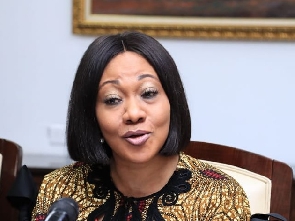 Jean Mensa, Electoral Commissioner
Jean Mensa, Electoral Commissioner
Professor Ernest Kofi Abotsi, Dean of the Law School at the University of Professional Studies, Accra (UPSA), has emphasized the urgent need to address the growing mistrust in the Electoral Commission (EC) and its operations.
He proposed that the appointment process for the chairs and other members of the Commission should be broadened, with expanded consultations to ensure that such appointments reflect the will of the people.
Prof Abotsi made this call during the annual public forum of the Ghana Academy of Arts and Sciences in Accra, held on Monday. The forum's theme was "National Elections in Ghana: Issues and Prospects."
Speaking on "Policy and Institutional Framework of National Elections in Ghana," Prof Abotsi noted that the EC is constitutionally structured to implement Ghana's electoral agenda, with the mandate to supervise and administer elections.
Article 45 of the Constitution tasks the Commission with compiling the electoral register, demarcating electoral boundaries for national and local elections, educating the Ghanaian populace on electoral processes, and expanding registration programs.
These responsibilities, according to Prof Abotsi, establish the EC as the primary authority on elections in Ghana, justifying its elevated status in electoral governance.
He also pointed out that the Commission's constitutional independence from the main political branches and actors of the State is crucial.
However, Prof Abotsi observed that the Commission's work has been deeply contested over the years, particularly by the two leading political parties—the National Democratic Congress and the New Patriotic Party.
"The EC is perceived as favorable only when a party is in power, with no objections raised against its activities. In contrast, the opposition views the EC with suspicion and skepticism," he remarked.
Prof Abotsi expressed concern over this mistrust, attributing it to the current mode of appointing the Commissioner and other members of the Commission by a sitting president.
He highlighted the problematic nature of this practice, especially when the appointing president may be a candidate in subsequent elections.
He warned that if unchecked, this could lead to a cycle where governments come and go with their appointed electoral commissioners, undermining the EC's functional autonomy.
"It is imperative to take immediate steps to deepen trust and confidence in the appointment process of the EC Commissioner. One way to achieve this is by enhancing the consultative aspect of the appointment process," he suggested.
Prof Abotsi recommended that future appointments of the Commissioner involve active consultation with opposition parties and key stakeholders.
"Recent controversies surrounding the use of the Ghana Card in voting, voter registrations, and re-registrations reflect the trust deficit that needs to be addressed," he added.
Prof Alidu Seidu, Head of the Department of Political Science at the University of Ghana, also spoke at the event, emphasizing the need for the Commission to implement measures to restore public confidence in its operations.
He advocated for strengthening the powers of the Inter-Party Advisory Committee (IPAC) to make its decisions binding on all parties, including the EC. He addressed the topic "Contribution of Political Parties to National Elections for Development: An Assessment."